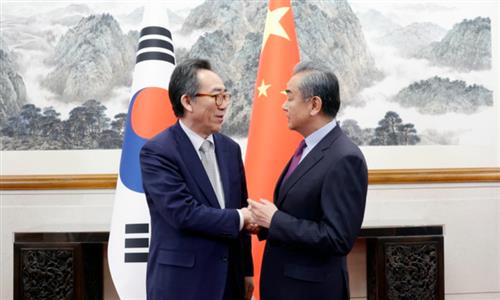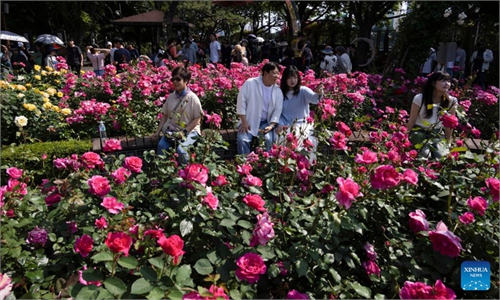
Illustration: Xia Qing/GT
Editor's Note:
According to the Chinese Foreign Ministry on Thursday, Premier Li Qiang of the State Council will attend the ninth Trilateral Summit Meeting among China, Japan and the Republic of Korea (ROK) in Seoul from May 26 to 27, the first such three-way meeting in more than four years. It marks the beginning of South Korea achieving its goal of having a summit with China, Hwang (Hwang) Jae-ho, a professor at Hankuk University of Foreign Studies in Seoul, told the Global Times (GT) in an interview. South Korea needs to improve relations with China, and there is acknowledged work for Seoul to do, Hwang said.
GT: What significance does the upcoming trilateral summit meeting have?
Hwang: This summit meeting will mark the beginning of South Korea achieving its goal of having a South Korea-China summit. The foreign ministers' meeting serves as the initial step. Recently, Chinese Foreign Minister Wang Yi held talks with Cho Tae-yul, foreign minister of South Korea, in Beijing during the latter's China visit. Following that would be the trilateral leader's meeting with China, Japan and South Korea, with the participation of the Chinese Premier Li Qiang.
The meeting may also serve other functions to China: influencing both China-South Korea and China-Japan bilateral relationships through the trilateral framework, while also serving as a response to the trilateral ties among the US, South Korea and Japan.
GT: Since President Yoon took office, he has made a concerted effort to deepen the alliance with the US. Hence, observers tend to think the outlook toward the China-South Korea relationship is not optimistic. How much room does South Korea have to adjust its policy toward China?
Hwang: After the April parliamentary elections, senior security officials in the administration of President Yoon remain unchanged. This implies continuity in the current government's diplomatic stance, particularly in its emphasis on ties with the US.
Nevertheless, Chang Ho-jin, South Korean National Security Office chief, and Foreign Minister Cho are former diplomats who have a deep understanding of diplomacy and recognize the importance of relations with China and Russia. Therefore, despite challenges, South Korean diplomacy is likely to show some technical flexibility in the future.
GT: Why is South Korea looking forward to a summit with China? What is the significance of China in South Korea's diplomacy?
Hwang: The importance of China to South Korea is always there. Over the past few decades, the rapid development of China-South Korea relations has been driven by economic interests and people-to-people exchanges. However, the positive development has sometimes led to overlooking underlying contradictions. When these contradictions arise and external factors exacerbate them, it can strain the relationship.
Can South Korea and China restore their previous status of strategic cooperative partners? I remain skeptical due to factors such as the competition between China and the US, the outcome of the US elections and President Yoon's strong ideological stance.
During Yoon's future tenure, the priority is to prevent the deterioration of China-South Korea relations rather than immediately seeking to boost them. The bilateral relationship has been somewhat stagnant over the past five years, including the two years under the current government and the three pandemic years, with limited communication between the two countries. To restore their partnership, it is necessary to seek cooperation during this transitional period.
GT: What prospects will the upcoming trilateral summit meeting, and enhanced cooperation among China, Japan and South Korea, bring to the East Asian region?
Hwang: Even if it looks like it has made some progress, the three parties involved are likely to make symbolic statements, more than practical ones. I believe it is more important to have the summit, with top leaders meeting face-to-face, whether it's between China and South Korea, China and Japan or South Korea and Japan.
GT: You mentioned that South Korea will continue to prioritize ties with the US, but at the same time it hopes to improve its relationship with China. To what extent will the US factor influence cooperation between China and South Korea?
Hwang: An unavoidable reality is that South Korea's foreign policy consistently shifts depending on whether conservatives or progressives are in power. The current right-wing government under President Yoon holds a conservative ideology. He believes that South Korea's current status and achievements are largely due to the assistance of the US, and thus, it is necessary to align closely with Washington. This mentality is likened to a form of "religious belief." As a result, South Korea has made economic and security concessions to the US over the past two years as sacrifices driven by this "belief."
China, on the other hand, understands South Korea is an ally of the US and is not asking South Korea to abandon that alliance, but rather hopes South Korea to seek a more balanced diplomatic relationship.
In South Korea's foreign policy, the relationship with the US takes precedence. I hope that China's relationship would come next.
Regarding the improvement of China-South Korean relations, there is acknowledged work for South Korea to do.
South Korea should avoid making unnecessary provocative remarks toward China. Since the Yoon administration took office, its statements on sensitive issues like the Taiwan question and the South China Sea issue have been more assertive than previous administrations, when these topics could have been avoided.
South Korea needs to engage in pragmatic diplomacy. The Yoon administration must prioritize the livelihoods of its people and support the activities of South Korean companies in China. Chinese Foreign Minister Wang said China is working on accelerating the development of new quality productive forces, something that could bring significant opportunities to South Korea. The South Korean side has also emphasized the need to strengthen economic and trade relations with China.



